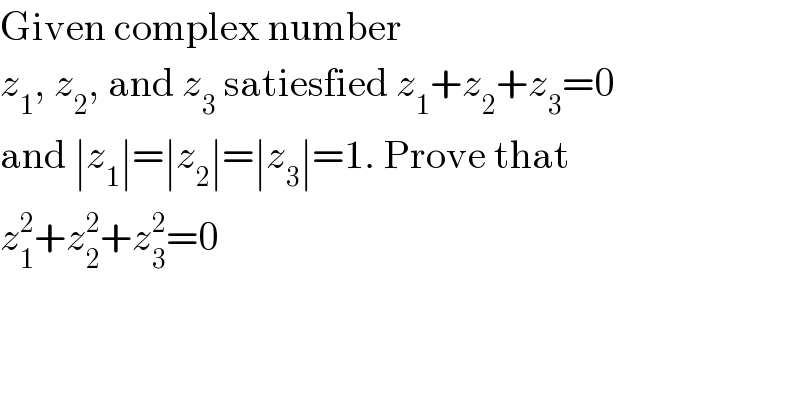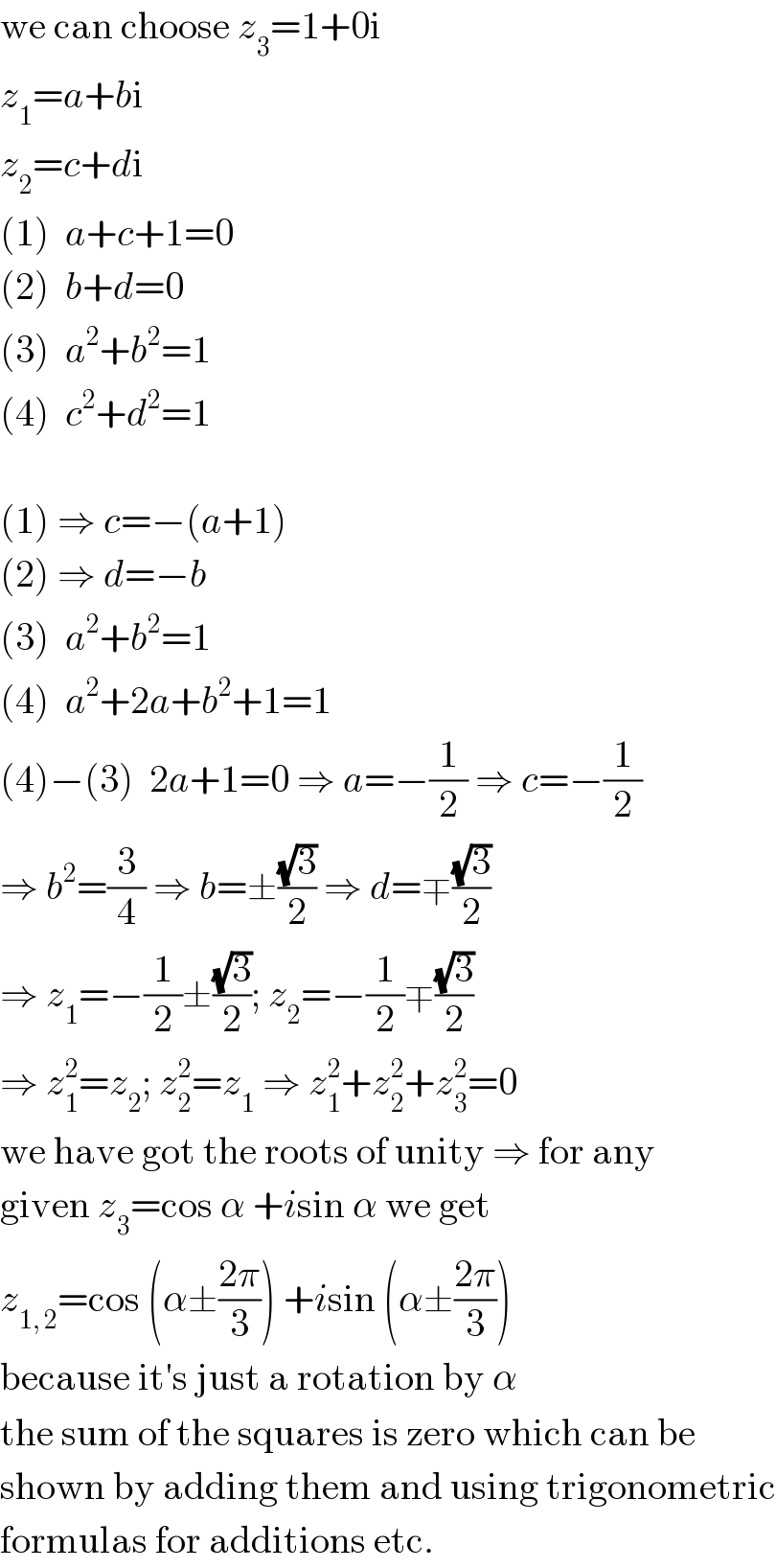
Question Number 56146 by gunawan last updated on 11/Mar/19

$$\mathrm{Given}\:\mathrm{complex}\:\mathrm{number} \\ $$$${z}_{\mathrm{1}} ,\:{z}_{\mathrm{2}} ,\:\mathrm{and}\:{z}_{\mathrm{3}} \:\mathrm{satiesfied}\:{z}_{\mathrm{1}} +{z}_{\mathrm{2}} +{z}_{\mathrm{3}} =\mathrm{0} \\ $$$$\mathrm{and}\:\mid{z}_{\mathrm{1}} \mid=\mid{z}_{\mathrm{2}} \mid=\mid{z}_{\mathrm{3}} \mid=\mathrm{1}.\:\mathrm{Prove}\:\mathrm{that} \\ $$$${z}_{\mathrm{1}} ^{\mathrm{2}} +{z}_{\mathrm{2}} ^{\mathrm{2}} +{z}_{\mathrm{3}} ^{\mathrm{2}} =\mathrm{0} \\ $$
Commented by MJS last updated on 11/Mar/19

$${z}_{\mathrm{1}} ,\:{z}_{\mathrm{2}} ,\:{z}_{\mathrm{3}} \:\mathrm{are}\:\mathrm{the}\:\mathrm{solutions}\:\mathrm{of} \\ $$$${z}^{\mathrm{3}} =\mathrm{cos}\:\mathrm{3}\alpha\:+{i}\mathrm{sin}\:\mathrm{3}\alpha \\ $$$${z}^{\mathrm{3}} =\mathrm{e}^{\mathrm{3i}\alpha} \:\Rightarrow\:{z}_{\mathrm{1}} =\mathrm{e}^{\mathrm{i}\alpha} ;\:{z}_{\mathrm{2}} =\mathrm{e}^{\mathrm{i}\left(\alpha−\frac{\mathrm{2}\pi}{\mathrm{3}}\right)} ;\:{z}_{\mathrm{3}} =\mathrm{e}^{\mathrm{i}\left(\alpha+\frac{\mathrm{2}\pi}{\mathrm{3}}\right)} \\ $$
Answered by MJS last updated on 11/Mar/19

$$\mathrm{we}\:\mathrm{can}\:\mathrm{choose}\:{z}_{\mathrm{3}} =\mathrm{1}+\mathrm{0i} \\ $$$${z}_{\mathrm{1}} ={a}+{b}\mathrm{i} \\ $$$${z}_{\mathrm{2}} ={c}+{d}\mathrm{i} \\ $$$$\left(\mathrm{1}\right)\:\:{a}+{c}+\mathrm{1}=\mathrm{0} \\ $$$$\left(\mathrm{2}\right)\:\:{b}+{d}=\mathrm{0} \\ $$$$\left(\mathrm{3}\right)\:\:{a}^{\mathrm{2}} +{b}^{\mathrm{2}} =\mathrm{1} \\ $$$$\left(\mathrm{4}\right)\:\:{c}^{\mathrm{2}} +{d}^{\mathrm{2}} =\mathrm{1} \\ $$$$ \\ $$$$\left(\mathrm{1}\right)\:\Rightarrow\:{c}=−\left({a}+\mathrm{1}\right) \\ $$$$\left(\mathrm{2}\right)\:\Rightarrow\:{d}=−{b} \\ $$$$\left(\mathrm{3}\right)\:\:{a}^{\mathrm{2}} +{b}^{\mathrm{2}} =\mathrm{1} \\ $$$$\left(\mathrm{4}\right)\:\:{a}^{\mathrm{2}} +\mathrm{2}{a}+{b}^{\mathrm{2}} +\mathrm{1}=\mathrm{1} \\ $$$$\left(\mathrm{4}\right)−\left(\mathrm{3}\right)\:\:\mathrm{2}{a}+\mathrm{1}=\mathrm{0}\:\Rightarrow\:{a}=−\frac{\mathrm{1}}{\mathrm{2}}\:\Rightarrow\:{c}=−\frac{\mathrm{1}}{\mathrm{2}} \\ $$$$\Rightarrow\:{b}^{\mathrm{2}} =\frac{\mathrm{3}}{\mathrm{4}}\:\Rightarrow\:{b}=\pm\frac{\sqrt{\mathrm{3}}}{\mathrm{2}}\:\Rightarrow\:{d}=\mp\frac{\sqrt{\mathrm{3}}}{\mathrm{2}} \\ $$$$\Rightarrow\:{z}_{\mathrm{1}} =−\frac{\mathrm{1}}{\mathrm{2}}\pm\frac{\sqrt{\mathrm{3}}}{\mathrm{2}};\:{z}_{\mathrm{2}} =−\frac{\mathrm{1}}{\mathrm{2}}\mp\frac{\sqrt{\mathrm{3}}}{\mathrm{2}} \\ $$$$\Rightarrow\:{z}_{\mathrm{1}} ^{\mathrm{2}} ={z}_{\mathrm{2}} ;\:{z}_{\mathrm{2}} ^{\mathrm{2}} ={z}_{\mathrm{1}} \:\Rightarrow\:{z}_{\mathrm{1}} ^{\mathrm{2}} +{z}_{\mathrm{2}} ^{\mathrm{2}} +{z}_{\mathrm{3}} ^{\mathrm{2}} =\mathrm{0} \\ $$$$\mathrm{we}\:\mathrm{have}\:\mathrm{got}\:\mathrm{the}\:\mathrm{roots}\:\mathrm{of}\:\mathrm{unity}\:\Rightarrow\:\mathrm{for}\:\mathrm{any} \\ $$$$\mathrm{given}\:{z}_{\mathrm{3}} =\mathrm{cos}\:\alpha\:+{i}\mathrm{sin}\:\alpha\:\mathrm{we}\:\mathrm{get} \\ $$$${z}_{\mathrm{1},\:\mathrm{2}} =\mathrm{cos}\:\left(\alpha\pm\frac{\mathrm{2}\pi}{\mathrm{3}}\right)\:+{i}\mathrm{sin}\:\left(\alpha\pm\frac{\mathrm{2}\pi}{\mathrm{3}}\right) \\ $$$$\mathrm{because}\:\mathrm{it}'\mathrm{s}\:\mathrm{just}\:\mathrm{a}\:\mathrm{rotation}\:\mathrm{by}\:\alpha \\ $$$$\mathrm{the}\:\mathrm{sum}\:\mathrm{of}\:\mathrm{the}\:\mathrm{squares}\:\mathrm{is}\:\mathrm{zero}\:\mathrm{which}\:\mathrm{can}\:\mathrm{be} \\ $$$$\mathrm{shown}\:\mathrm{by}\:\mathrm{adding}\:\mathrm{them}\:\mathrm{and}\:\mathrm{using}\:\mathrm{trigonometric} \\ $$$$\mathrm{formulas}\:\mathrm{for}\:\mathrm{additions}\:\mathrm{etc}. \\ $$
